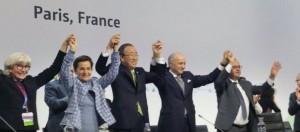by Stacy D. VanDeveer
Department of Conflict Resolution, Human Security and Global Governance
 The last several weeks have seen important actions to curb climate change. Since the historic Paris Agreement on climate change was negotiated in December of 2015, the big question has been about whether governments, cities, corporations, and individuals can sustain political momentum and move from announced agreements to concrete actions. Globally, we have seen several good signs recently.
The last several weeks have seen important actions to curb climate change. Since the historic Paris Agreement on climate change was negotiated in December of 2015, the big question has been about whether governments, cities, corporations, and individuals can sustain political momentum and move from announced agreements to concrete actions. Globally, we have seen several good signs recently.
First, in the run-up to September’s G20 summit in China, the Obama administration and the Chinese government agreed that each would ratify the Paris Agreement, putting the world’s two largest emitters (by far) squarely in support of Paris Agreement goals. For the Paris Agreement to become legally binding, the agreement stipulates that 55 countries that together constitute 55% of global emissions must ratify it. Together, the United States and China make up 38% of global emissions. The news of U.S. and Chinese ratification seems to have spurred others to ratify quickly, bringing on the second piece of good news. With over 80 ratifications to date, which together surpass the 55% emissions threshold, the Paris Agreement will enter into legal force in early November. Taking less than one year to enter into force is extremely fast, by the standards of global agreements.
International post-Paris momentum continued in October, with two additional global agreements to curb greenhouse gas emissions from the airline industry–negotiated within the International Civil Aviation Organization (ICAO)–and a deal reduce emissions of hydrofluorocarbons (HFCs) used in refrigerators and air conditions. The HFCs agreement was negotiated under the auspices of the Montreal Protocol for the protection of the ozone layer. ICAO airline emissions control is modest in terms of its emissions goals, but it constitutes an important first step for an industry that has largely fought and avoided regulations on its growing greenhouse gas emissions. The HFCs agreement, under discussion for several years, is even more important, in part because HRCs trap over 1000 times more heat in the atmosphere than carbon. It curbs production and consumption of HFCs by 80-85% between 2018 and 2047. It is–dare we say it–“bigly.”
Neither the U.S. government nor its president control global events, but they can help to shape them. The Obama administration worked hard to produce these bilateral and international agreements, and its growing record of climate change leadership is among the major drivers of recent climate action momentum. In fact, the administration has been busy at home as well as abroad. It continues to defend its Clean Power Plan (for greenhouse emissions from power plants) and its proposed methane regulations for the natural gas industry in court̶ -and to work with U.S. states willing to take further action on greenhouse gas emissions, energy efficiency, and renewable energy expansion. In August, Obama’s Environmental Protection Agency finalized new rules, with industry support, for fuel economy increases for 18 wheelers, buses, and other heavy duty trucks. In September, the administration issued a presidential memorandum directing all federal departments and agencies to assess the connections of their activities to the interrelated challenges of climate change and? national security.
All of the countries belonging to the United Nations Framework Convention on Climate Change meet for the annual conference in late November and early December in Marrakesh. The agenda will be dominated by tasks associated with the implementation and information reporting requirements related with the individual commitments each took under last year’s Paris Agreement. The climate change problem is huge, in terms of emissions reductions and looming adaptation challenges, as illustrated by the constant stream of news stories about record setting global temperatures–almost every month and every year. Despite the post-Paris climate action momentum of the last few weeks, much more action is required. The last year has been historic for climate change policymaking, but we now need every year to be a big year for climate action. We all better get busy–bigly.
 Stacy VanDeveer (PhD, University of Maryland) is a professor of global governance and human security. His research focuses on global resources and energy politics, global environmental and resource governance, comparative politics, the European Union, environmental change, and human security.
Stacy VanDeveer (PhD, University of Maryland) is a professor of global governance and human security. His research focuses on global resources and energy politics, global environmental and resource governance, comparative politics, the European Union, environmental change, and human security.
